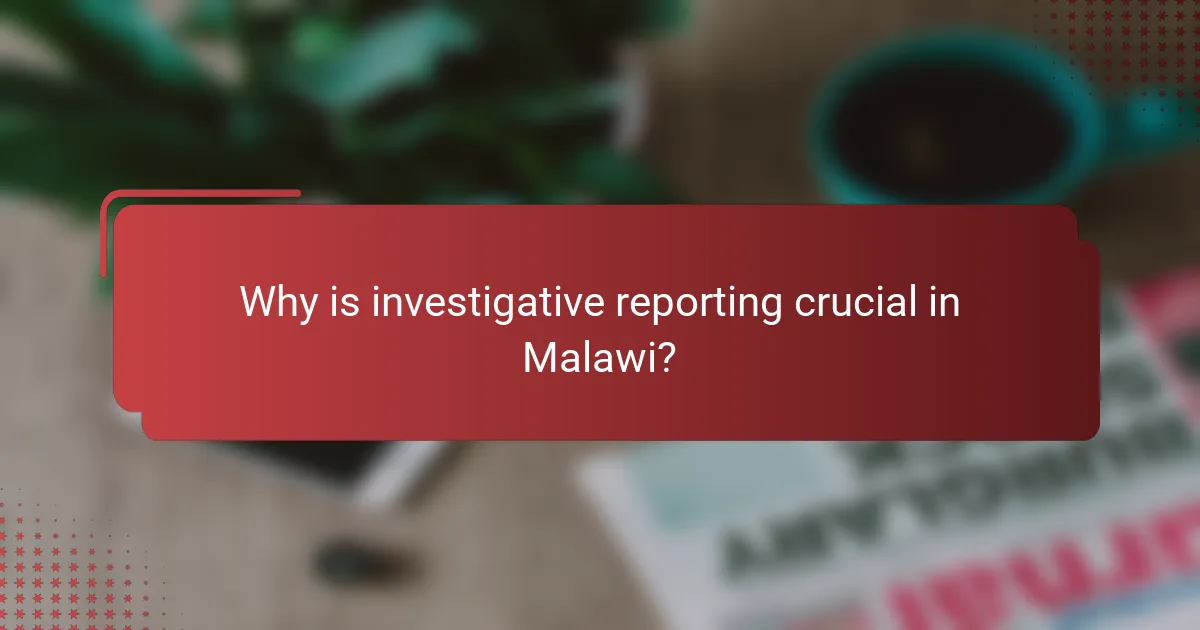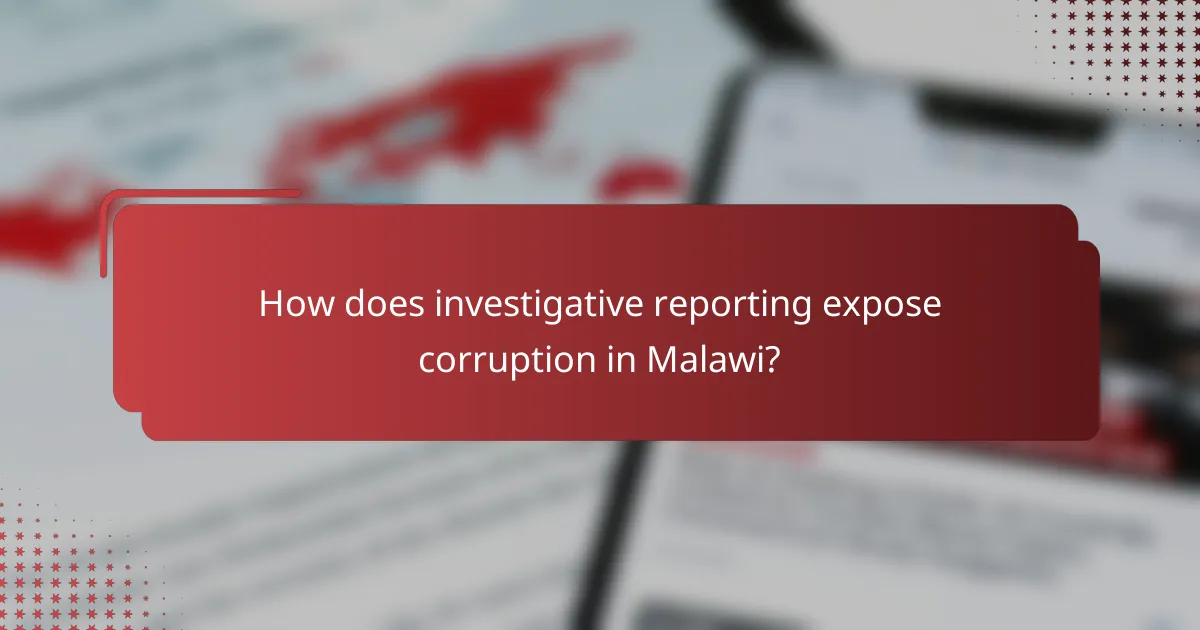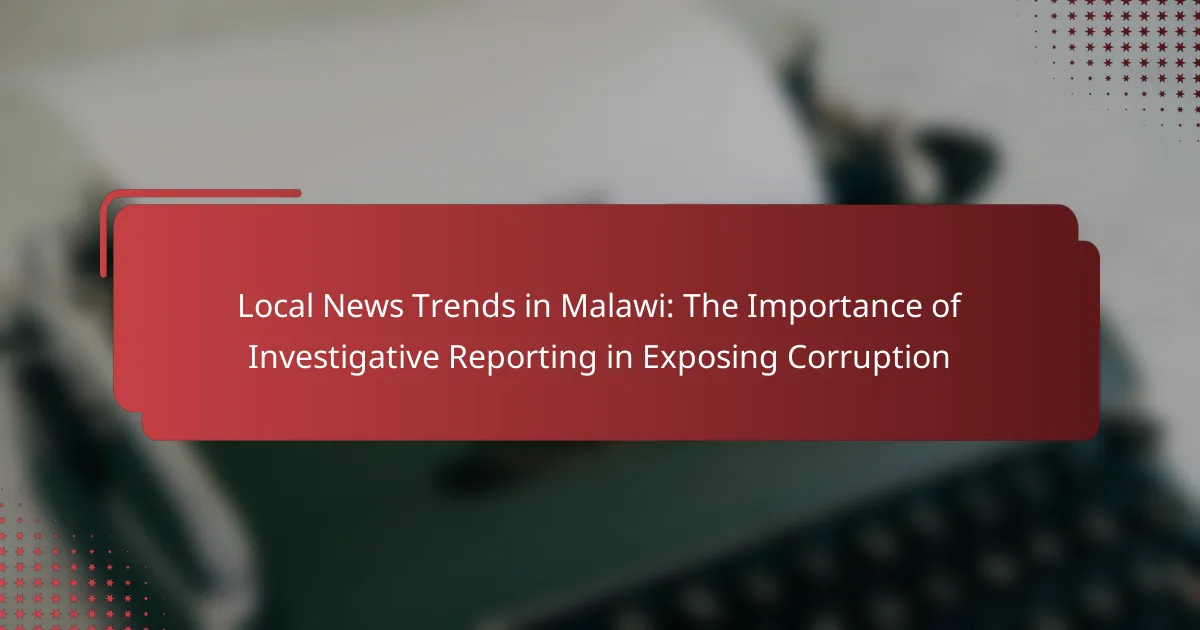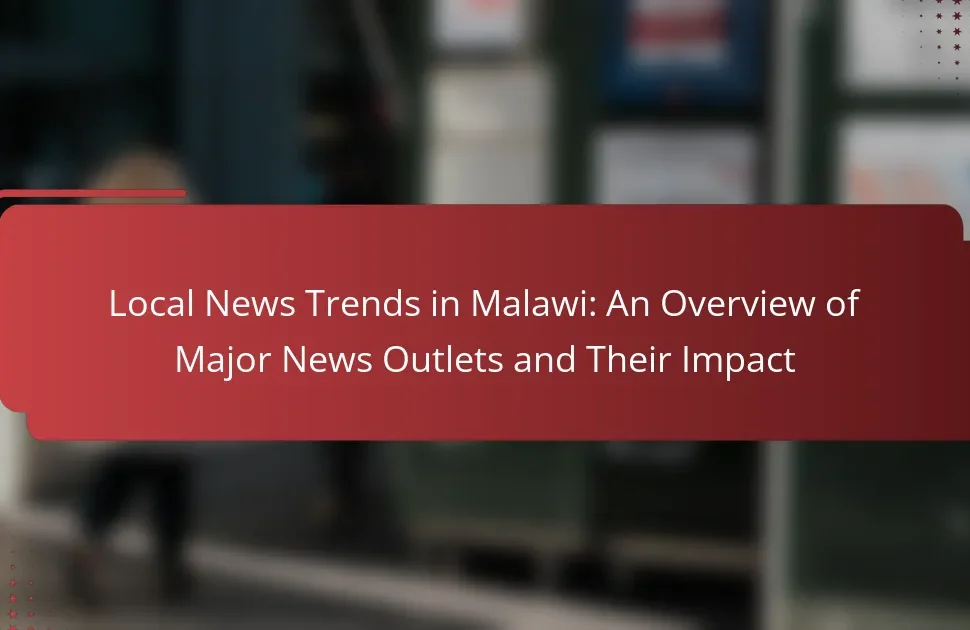The article focuses on the significance of investigative reporting in Malawi, particularly its role in exposing corruption and promoting government accountability. It highlights the growing trend of journalists uncovering mismanagement of public funds and unethical practices, which has spurred public discourse and engagement. Key cases, such as the Cashgate scandal, exemplify the impact of investigative journalism on governance and transparency. The piece also discusses how local media collaboration and the influence of social media enhance the dissemination of news, reflecting a heightened demand for accountability in Malawi’s political landscape. Overall, the article underscores the essential function of investigative reporting in fostering an informed citizenry and strengthening democracy.

What are the current local news trends in Malawi?
Current local news trends in Malawi focus on investigative reporting, particularly regarding corruption. Journalists increasingly highlight government accountability and transparency. Reports reveal ongoing issues with mismanagement of public funds. Investigative stories often involve high-profile cases, prompting public discourse. Social media plays a significant role in disseminating news rapidly. Citizens engage more actively in discussions about governance. Local media outlets are collaborating to enhance reporting standards. These trends indicate a growing demand for accountability in Malawi’s political landscape.
How has the landscape of local news evolved in recent years?
The landscape of local news has evolved significantly in recent years. Digital platforms have become primary sources for local news. Traditional print media has seen a decline in readership and revenue. Many local news outlets have transitioned to online formats to reach wider audiences. Social media has also played a crucial role in disseminating news quickly. Investigative reporting has gained importance in exposing corruption and holding authorities accountable. In Malawi, local news organizations are increasingly focusing on investigative journalism. This shift reflects a growing demand for transparency and accountability in governance.
What role do digital platforms play in local news dissemination?
Digital platforms play a crucial role in local news dissemination by providing immediate access to information. They enable local news outlets to reach wider audiences beyond traditional geographic limitations. Social media platforms facilitate real-time updates and community engagement. This interactivity allows citizens to share their perspectives and contribute to news stories. According to a 2021 Pew Research Center study, 53% of adults in Malawi access news via social media. This trend highlights the shift from print to digital mediums for local news. Additionally, digital platforms allow for multimedia storytelling, enhancing the presentation of news. Overall, these platforms significantly enhance the visibility and accessibility of local news content.
How have audience preferences shifted regarding local news consumption?
Audience preferences regarding local news consumption have shifted towards digital platforms. More people now prefer accessing news online rather than through traditional print media. A survey by the Pew Research Center in 2021 indicated that 57% of adults in Malawi consume news primarily through social media. This trend reflects a growing reliance on mobile devices for real-time updates. Additionally, audiences seek more interactive and engaging content. Local news outlets are adapting by enhancing their online presence. They are focusing on multimedia storytelling to attract younger demographics. This shift highlights the importance of adapting to audience needs for sustained engagement.
What challenges do local news outlets face in Malawi?
Local news outlets in Malawi face significant challenges. Limited financial resources hinder their ability to operate effectively. Many outlets struggle with inadequate funding, impacting staff salaries and operational costs. Journalists often lack access to training, which affects the quality of reporting. Political pressure can lead to censorship and self-censorship among reporters. There is also a lack of infrastructure, such as reliable internet access, which limits news dissemination. Additionally, competition from social media platforms poses a challenge to traditional news outlets. These factors collectively undermine the effectiveness of local journalism in Malawi.
How does funding impact the quality of local news reporting?
Funding directly impacts the quality of local news reporting by determining resource availability. Adequate funding allows news organizations to invest in skilled journalists and comprehensive training. This investment leads to better investigative reporting, which is crucial for exposing corruption. In Malawi, limited funding has resulted in fewer resources for fact-checking and in-depth research. A study by the International Journal of Press/Politics found that newsrooms with higher budgets produce more accurate and thorough reports. Therefore, funding is essential for maintaining high standards in local news reporting.
What are the implications of media ownership on news content?
Media ownership significantly influences news content. Ownership can lead to biased reporting, as owners may prioritize their interests. This bias affects the diversity of viewpoints presented in news stories. In Malawi, media ownership often concentrates in the hands of a few individuals. This concentration limits the range of topics covered, particularly investigative reporting. Investigative journalism is crucial for exposing corruption. Limited ownership diversity can stifle critical reporting on powerful entities. Studies show that media monopolies can reduce public trust in news sources. Thus, media ownership directly impacts the integrity and quality of news content.

Why is investigative reporting crucial in Malawi?
Investigative reporting is crucial in Malawi because it exposes corruption and holds powerful entities accountable. This form of journalism uncovers hidden truths that can lead to legal action and reform. In a country where corruption significantly impacts governance, investigative reporting serves as a watchdog. It informs the public about misuse of resources and government malfeasance. Reports have revealed high-profile corruption cases, prompting public outcry and demands for change. For instance, the 2014 Cashgate scandal highlighted massive embezzlement in government. Such revelations can lead to policy changes and improved transparency. By shining a light on corruption, investigative reporting fosters a more informed citizenry and strengthens democracy in Malawi.
What defines investigative reporting in the context of Malawi?
Investigative reporting in Malawi is defined by its focus on uncovering corruption and holding power accountable. This type of journalism often involves in-depth research and analysis of government and corporate activities. Journalists in Malawi face significant challenges, including threats and censorship. However, they play a crucial role in promoting transparency and democracy. Notable cases have revealed misappropriation of funds and abuse of power. The work of investigative reporters has led to public outcry and policy changes. Such reporting is essential for fostering a culture of accountability in Malawi’s political landscape.
How does investigative reporting differ from regular news reporting?
Investigative reporting differs from regular news reporting primarily in its depth and intent. Investigative reporting involves thorough research, often uncovering hidden truths and systemic issues. It typically takes weeks or months to produce, focusing on complex topics like corruption or abuse of power. Regular news reporting, in contrast, covers events quickly and often focuses on immediate news or updates. Investigative pieces rely on extensive interviews, documents, and data analysis to support claims. This method aims to inform the public and promote accountability, while regular reporting primarily informs without extensive analysis. The difference is crucial in contexts like Malawi, where investigative journalism can expose corruption and drive social change.
What skills are essential for investigative journalists in Malawi?
Essential skills for investigative journalists in Malawi include critical thinking, research proficiency, and effective communication. Critical thinking enables journalists to analyze information and discern credible sources. Research proficiency is vital for gathering facts and uncovering hidden details. Effective communication helps in articulating findings clearly to the public. Additionally, ethical integrity is crucial for maintaining trust and credibility. Familiarity with legal frameworks ensures journalists navigate potential challenges in reporting. Adaptability to various media platforms enhances their ability to reach wider audiences. Finally, persistence is key in pursuing complex stories, often requiring extensive follow-up and dedication.
What impact does investigative reporting have on society?
Investigative reporting significantly impacts society by uncovering truths and promoting accountability. It exposes corruption, abuse of power, and social injustices. For instance, investigative reports in Malawi have revealed instances of government corruption, prompting public outcry and policy changes. This type of journalism informs citizens, empowering them to demand transparency. Furthermore, it holds institutions accountable, leading to legal repercussions for wrongdoers. Research shows that societies with strong investigative reporting have lower corruption levels. A study by the World Bank indicates that transparency in media correlates with improved governance. Therefore, investigative reporting serves as a critical tool for societal progress and justice.
How does it contribute to transparency and accountability?
Investigative reporting contributes to transparency and accountability by uncovering hidden information about corruption. It reveals unethical practices within government and institutions. This form of journalism holds officials accountable for their actions. By publishing findings, it informs the public and encourages civic engagement. Transparency increases as citizens become aware of issues affecting their communities. Investigative reports often lead to policy changes and reforms. A study by the International Consortium of Investigative Journalists found that such reporting can result in significant legal and political consequences for wrongdoers. This demonstrates the power of investigative journalism in promoting integrity and trust in society.
What are some notable examples of successful investigative reporting in Malawi?
Notable examples of successful investigative reporting in Malawi include the uncovering of the cashgate scandal. This scandal revealed massive corruption involving government officials and the embezzlement of public funds. Investigative journalists from the Malawi News Agency and other outlets played a crucial role in exposing the details. Their reports led to public outcry and subsequent government investigations. Another significant case involved the investigation into the misuse of funds in the National Aids Commission. Journalists discovered discrepancies in financial reports that prompted further scrutiny. These examples highlight the impact of investigative reporting on accountability in Malawi.

How does investigative reporting expose corruption in Malawi?
Investigative reporting exposes corruption in Malawi by uncovering hidden financial misconduct and unethical practices. Journalists conduct in-depth research and interviews to gather evidence. They analyze public records and financial statements to identify discrepancies. Reports often highlight misuse of public funds by government officials. Investigative stories can lead to public outrage and demand for accountability. For instance, the 2013 Cashgate scandal revealed extensive theft of government funds. This scandal prompted investigations and reforms in financial oversight. Consequently, investigative reporting plays a crucial role in promoting transparency and good governance in Malawi.
What methods do journalists use to uncover corruption?
Journalists use various methods to uncover corruption, including investigative research, whistleblower interviews, and data analysis. Investigative research involves examining public records and documents to find evidence of wrongdoing. Whistleblower interviews allow journalists to gather insider information from individuals willing to expose corruption. Data analysis helps journalists identify patterns and anomalies in financial records or government spending. Additionally, journalists often collaborate with non-governmental organizations for support and access to resources. These methods have proven effective in exposing corruption in various contexts, including local news in Malawi.
How do sources and whistleblowers contribute to investigative efforts?
Sources and whistleblowers play a crucial role in investigative efforts by providing critical information that can expose corruption. They often have firsthand knowledge of wrongdoing or unethical practices. This information can lead to uncovering hidden facts that would otherwise remain undisclosed. For instance, whistleblowers may share documents, insider accounts, or evidence that supports allegations of misconduct.
In Malawi, investigative reporting has relied on these individuals to reveal cases of corruption within government and institutions. Reports indicate that whistleblowers have successfully prompted investigations that resulted in legal actions against corrupt officials. Their contributions not only aid journalists but also empower the public to hold authorities accountable.
Thus, sources and whistleblowers are essential for fostering transparency and integrity in governance through their willingness to share vital information.
What role does data journalism play in exposing corruption?
Data journalism plays a crucial role in exposing corruption by analyzing and presenting complex data in an accessible format. It allows journalists to uncover patterns and trends that may indicate corrupt practices. For example, data on government spending can reveal discrepancies that suggest misallocation of funds. Investigative reports often use data to support claims, making findings more credible. In Malawi, data journalism has been pivotal in highlighting issues like fraudulent procurement processes. By visualizing data, journalists can engage the public and policymakers, prompting accountability. The systematic analysis of data helps to bring transparency to governance, making it harder for corruption to thrive.
What are the risks faced by investigative journalists in Malawi?
Investigative journalists in Malawi face several significant risks. These include threats of violence, harassment, and intimidation from political figures and corrupt entities. Journalists often experience legal challenges aimed at silencing their reporting. There is a pervasive climate of fear that discourages thorough investigation. Additionally, some journalists have faced arbitrary detention and censorship. Access to information can be obstructed, further complicating their work. Reports indicate that these risks can lead to self-censorship among journalists. The need for protection and support for investigative journalists in Malawi is critical to ensure press freedom.
How do threats and intimidation affect journalistic integrity?
Threats and intimidation significantly undermine journalistic integrity. Journalists facing such pressures may self-censor to avoid retaliation. This compromises the accuracy and depth of reporting. Investigative reporting is particularly vulnerable, as it often exposes powerful entities. For instance, in Malawi, journalists have reported threats when covering corruption. This creates a chilling effect, deterring others from pursuing similar stories. Consequently, the public loses access to crucial information. Studies show that environments with high intimidation correlate with lower media freedom. Thus, threats and intimidation erode trust in journalism and diminish accountability.
What legal protections exist for journalists in Malawi?
Journalists in Malawi are protected by the Constitution, which guarantees freedom of expression. The Access to Information Act enhances transparency and supports journalistic activities. Additionally, the Media Council of Malawi provides ethical guidelines and mechanisms for addressing grievances against journalists. However, despite these protections, journalists often face harassment and threats, indicating challenges in enforcement.
What can be done to strengthen investigative reporting in Malawi?
To strengthen investigative reporting in Malawi, enhancing training for journalists is essential. Providing workshops on investigative techniques can improve skills. Establishing partnerships between local media and international organizations can offer resources and support. Increasing funding for investigative journalism initiatives can facilitate in-depth reporting. Implementing legal protections for journalists can ensure their safety. Encouraging public engagement in reporting can foster community involvement. Supporting fact-checking organizations can enhance accuracy in reporting. Lastly, promoting a culture of transparency within government can aid investigative efforts.
How can training and resources improve investigative journalism?
Training and resources can significantly enhance investigative journalism by equipping journalists with essential skills and tools. Training programs improve critical thinking, research methodologies, and ethical reporting practices. Access to resources such as databases, software, and legal support enables journalists to conduct thorough investigations. For instance, investigative courses often include modules on data journalism and source verification techniques. Resources like grants and funding allow for more extensive fieldwork and in-depth reporting. A study by the International Center for Journalists found that trained journalists produce higher quality reports and have a greater impact on public awareness. Thus, comprehensive training and adequate resources lead to more effective investigative journalism.
What role do community engagement and support play in fostering investigative efforts?
Community engagement and support are crucial for fostering investigative efforts. They enhance information sharing between journalists and the public. Engaged communities are more likely to report issues and provide tips. This grassroots involvement can lead to uncovering hidden corruption. For example, local support networks can mobilize resources for investigations. Additionally, community backing can protect journalists from potential backlash. Engaged citizens often advocate for transparency and accountability. Studies show that investigative reporting thrives in environments with strong community ties. Overall, community engagement significantly boosts the effectiveness of investigative journalism.
Local news trends in Malawi increasingly emphasize investigative reporting as a vital tool for exposing corruption and ensuring government accountability. The article explores the evolution of local news, highlighting the shift from traditional print media to digital platforms, which facilitate rapid dissemination and audience engagement. It addresses the challenges faced by local news outlets, including funding limitations and political pressures, while underscoring the essential role of investigative journalism in promoting transparency and fostering public discourse. Key examples of successful investigative efforts, the impact of community engagement, and the skills necessary for journalists are also discussed, revealing the integral connection between investigative reporting and societal progress in Malawi.




